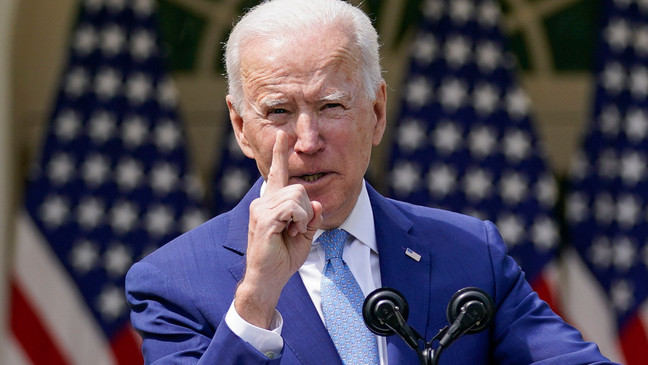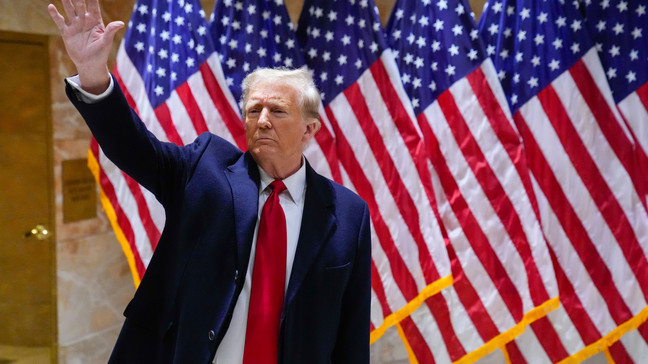Senate's bipartisan border bill faces opposition from Trump and House GOP
(TND) — President Joe Biden is backing a bipartisan compromise in the Senate to address the crush of migrants at our southern border.
But former President Donald Trump is lobbying lawmakers to reject the deal.
Meanwhile, Senate negotiators say this is a good bill that’s perhaps getting unfair criticism before the text is even finalized and shared with lawmakers.
“Right now, they're all functioning off of internet rumors of what's in the bill,” said Oklahoma Sen. James Lankford, a Republican negotiator. “And many of them are false.”
He and Democratic negotiator, Connecticut Sen. Chris Murphy, both appeared on Sunday morning news programs to discuss the bill that could go to the Senate floor in a matter of days.
Lankford said they’re nearing a resolution after four months of negotiating.
Lankford said he doesn’t have a vote count but does “feel very positive about it, because even the initial feedback has been good.”
But Lankford’s Republican colleagues in the House, and perhaps some in the Senate, don’t appear to be on board with the deal.
House Speaker Mike Johnson reportedly said the Senate bill would be “dead on arrival” in his chamber, which passed the conservative border bill H.R. 2 in May along party lines.
“The President must start by using the broad legal authority he already possesses to reclaim our nation's sovereignty and end the mass release of illegal aliens into our country,” Johnson said in a weekend social media post.
Biden said the legislation being hashed out in the Senate would give him and future presidents “a new emergency authority to shut down the border when it becomes overwhelmed. And if given that authority, I would use it the day I sign the bill into law.”
“For everyone who is demanding tougher border control, this is the way to do it,” Biden said in a statement late last week. “If you’re serious about the border crisis, pass a bipartisan bill and I will sign it.”
His presidential predecessor and likely rival this coming election, Trump, has been a vocal critic of the Senate immigration compromise.
“I'd rather have no bill than a bad bill,” Trump said at a weekend campaign event.
Murphy, speaking to CNN, said the bill would allow the president to shut down the border between ports of entry when crossings reach “catastrophically high levels.”
CNN reported that the authority would kick in when migrant crossings average at least 4,000 per day for a week.
Lankford, speaking to CBS’ “Face the Nation,” said we can’t effectively process that many migrants each day.
“By the hundreds of thousands, people are just being released in the country, and we have no tracking on them at all,” Lankford said. “That has to stop. This is a national security issue for us.”
The last four months were among the six busiest months at the border. And encounters jumped from about 242,000 in November to over 300,000 last month.
Murphy said their bill would also speed up asylum hearings, which can currently take years, and would get work permits faster to migrants with hopes they can be more self-sufficient and ease the strain on shelters and social services in American cities.
Biden, who said in his Friday statement that “the border’s been broken,” is also seeking billions from Congress for a set of national security priorities that include border enforcement and Ukraine aid.
Biden wants more Border Patrol agents, more asylum officers, more immigration judge teams, and new machines to help detect fentanyl at our southwest border ports of entry.
RELATED STORY: What's fueling the surge at the southern border?
Lankford was asked during his “Face the Nation” interview if the Senate bill can get passed without Trump’s approval.
“I'm looking forward to President Trump getting the opportunity to be able to read it like everybody else is,” he said. “There's a lot of misinformation out there right now.”
The bill would bring about “dramatic change” in “how we handle our immigration system and how we work to be able to secure our border completely,” Lankford said during the interview.
Lankford praised Trump’s handling of the border, but he also said this bill gives the president “new authority.”
“Even while he was president, (Trump) was specifically asking Congress to change the standard on asylum, to be able to tighten up, to be able to give him additional funds for deportation,” Lankford said. “All of those things are in this bill.”
Kevin R. Johnson, an expert in immigration law and policy at UC Davis, said Monday that this bill is “a compromise that might not appeal to all of those involved in immigration discussions but does address some of the real concerns with the numbers of migrants at the border.”
He likened this bill’s new authority to close the border during a surge to how the Title 42 public health emergency was used during the pandemic to turn away migrants.
House Republicans have called for the Senate to instead take up their immigration bill, H.R. 2.
Johnson, the immigration policy expert, said there’s a big gap between what’s reportedly included in the Senate bill and what’s in H.R. 2.
“I think it's like the Grand Canyon,” he said.
H.R. 2 would include resumption of the border wall construction, but that’s not the only difference with what’s being negotiated in the Senate.
“H.R. 2 is premised on the idea that there's asylum abuse going on and tries to restrict asylum,” UC Davis’ Johnson said. “The Senate, as far as I can tell, doesn't really deal with asylum claims across the board. It's really designed to deal with allowing people into the country when large numbers of people are seeking entry into the country. So, I don't think it's nearly as comprehensive in approach. And I think that H.R. 2 had some aspects that would criminalize undocumented status and in effect would punish undocumented people (that’s), as far as I know, nowhere to be found in the Senate bill.”
Oklahoma State University politics professor Seth McKee said he thinks the compromise can pass the Senate but will be a “massive, heavy lift” to get through the House.
Republican senators and Republican representatives might split on their support for the bill in part because of “very different electoral incentives.”
House members, McKee said, are more likely to come from “incredibly red and blue districts,” which makes them less likely to seek compromise with the other side.
Lankford, the key GOP negotiator, hails from “deep Red Oklahoma,” McKee said. But even there, a senator can make a “winning argument” for a compromise deal they say will be good for America’s immigration policy.
Murphy, the Senate Democratic negotiator, said passage of their bill will come down to Republicans choosing policy over politics.
“We do have a bipartisan deal,” Murphy said. “We're finishing the text right now and the question is whether Republicans are going to listen to Donald Trump, who wants to preserve chaos at the border because he thinks that it's a winning political issue for him, or whether we are going to pass legislation which would be the biggest bipartisan reform of our bordered immigration laws in 40 years and would give the president of the United States, whether that president is a Republican or a Democrat, new, important power to be able to better manage the flow of people across the border.”
McKee said House Republicans face a “dilemma” over the bill, and he expects some of them will want to pass it while others won’t.
“If Trump is able to tank it in the House, that's good for Democrats,” McKee said. “Because they said, ‘Look, you keep screaming about border security, and we're trying to cut a deal. And ironically, you're the one stopping it.’ So, that's a terrible look politically for Republicans.”
Meanwhile, supporting the Senate deal is a “no-brainer” for Biden, McKee said.
Polling shows that a growing share of Americans view illegal immigration as a very big problem in the country. And more Americans side with Republican policies for dealing with the border.
“Biden's really been taking heat on this,” McKee said.
“They're not in any electoral jeopardy whatsoever by trying to get tougher on the border,” McKee added. “All they do is win support from the middle of the electorate.”




